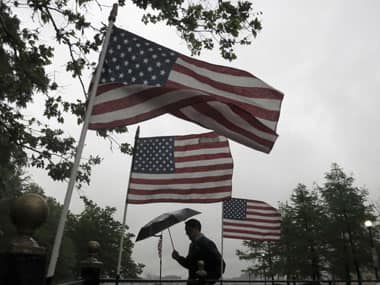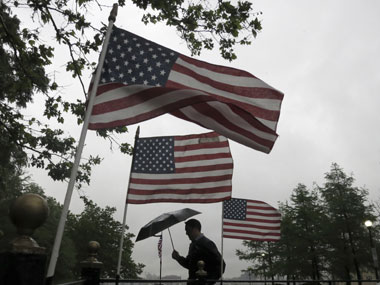Profound structural transformations have wrought changes in world order, international politics and international political economy. World politics and even economics is in transition. The nature of causality here is difficult to establish. What is clear is that we are living in ‘interesting times’ wherein change is occurring at a dizzying pace. The scope, direction and depth of this change is rending asunder older paradigms and shibboleths that were held to be sacrosanct. An eloquent and notable example of this is the resurgence of Asia-politically and economically, and the transatlantic drift or even split which is renting asunder the notion of a unified west. [caption id=“attachment_901333” align=“alignleft” width=“380”]
 Image for representation only. AFP[/caption] The West, while it still retains a margin of superiority over other states or even civilizations is not ascendant anymore. This statement needs to be qualified. By this assertion, it is not meant that the West is in decline or that it is about to be supplanted by some other force or entity but that it is being challenged by what may be called the non-west. This non-west comprises largely of Asia and is somewhat complemented by other swing states in the international system like Brazil, South Africa and, perhaps Russia. Having said this, the west is being challenged in an idiom and framework — conceptual and practical — that is western. This paradox gives short shrift to the notion of the decolonised world challenging the erstwhile imperial west in a native idiom. It is not a change in the strategy of the decolonised but has accrued from a world historical mega trend called globalization. The questions that this development and trend raises are: are the west and the non west led by Asia doomed to a confrontational dynamic? Will this lead to a civilisational clash? What does this bode for the west? What should be the nature of engagement between the West and the non-West? Should the non-West ‘avenge’ the historical wrongs-real and imagined-by the West? And what does this trend tell us about world order and politics? Confrontation between the West and the non-West led by Asia is the least likely scenario that will pan out. Why? The reasons are obvious: a lot is at stake, especially for the non-West in the current dispensation and order. The non-West has reaped benefits and dividends from this dispensation and will thus continue to latch on to it unless this order or dispensation starts yielding diminishing returns. This then effectively gives short shrift to a confrontational dynamic and precludes war. However, it does not mean that all will be hunky dory. There are a range of issues, climate change for instance, or trade, that the west and the non west do not see eye to eye. This is overlain by an institutional logic which has a clear cut western cast. In this schema, the west and the non west will clash but then this will fall in the domain of low politics. The ensuing frisson and friction will not lead to war. All this has implications for the west and the non west. The west is and will no longer be a coherent entity as it was. The trans-Atlantic drift and the existential problems that the European Union is gripped by will render the west into a more smaller entity which may be termed as the ’neo-west’. Countries that have emerged from the womb of the United Kingdom-Australia, Canada, United States and New Zealand will form the core of the west or the ’neo-west’. This will or, in fact, has left Europe marginalised and a lone actor in international politics and economics and a fragmented entity essentially at odds with itself. In this dispensation, the non-West should look toward the neo-West for engagement. The United States, contrary to claims of even relative decline by most indices of power, will lead the neo west pack. The non west must assert itself, question the extant distribution of power and negotiate a change in this. This should mean parity in international organisations and voice that is powerful. This will naturally happen over a period of time given the drift of international politics and relations but it would be prudent if it happens sooner than later. An international system and structure that is reflective of distribution of power is a more vibrant and peaceful one than the converse. The west, in turn, should not retreat into itself. It should look towards new partners and actors that, unlike Europe, have or potentially have a determinative influence on world politics. These actors include India in South Asia, South Africa in the African continent and Brazil and, despite the morass, it is in, Argentina in South America. Europe is dead. It died decades ago and attempts at European resurgence have till now been in vain despite the formation of the European Union. It is about time that chimerical attempts at forging or even thinking of a ‘united west’ are given up. The neo-west led by the United States should look beyond. The injection and insertion of these states and entities into world politics is a given and is inexorable. And more likely than not, the nature of this rise and ascendancy will be peaceful and informed by a cooperative dynamic. This bodes well for a peaceful and cooperative world order but goes against the gravament of most theoretical constructs of international politics. The theoretical approach that will best correspond and speak to this emerging and emergent order will be an eclectic one. We are on the cusp of far reaching dynamic change and transition. This, by and large , constitutes an opportunity. These changes and the nature of the transition demands that old shibboleths be dropped and historical wrongs discared. The need of the hour is to grasp this change and direct it towards salubrious directions. It is then a world order that redounds to be benefit of humanity can be created. Let the west and non west notions be dropped and let a new , bold and beautiful world order be created.
Image for representation only. AFP[/caption] The West, while it still retains a margin of superiority over other states or even civilizations is not ascendant anymore. This statement needs to be qualified. By this assertion, it is not meant that the West is in decline or that it is about to be supplanted by some other force or entity but that it is being challenged by what may be called the non-west. This non-west comprises largely of Asia and is somewhat complemented by other swing states in the international system like Brazil, South Africa and, perhaps Russia. Having said this, the west is being challenged in an idiom and framework — conceptual and practical — that is western. This paradox gives short shrift to the notion of the decolonised world challenging the erstwhile imperial west in a native idiom. It is not a change in the strategy of the decolonised but has accrued from a world historical mega trend called globalization. The questions that this development and trend raises are: are the west and the non west led by Asia doomed to a confrontational dynamic? Will this lead to a civilisational clash? What does this bode for the west? What should be the nature of engagement between the West and the non-West? Should the non-West ‘avenge’ the historical wrongs-real and imagined-by the West? And what does this trend tell us about world order and politics? Confrontation between the West and the non-West led by Asia is the least likely scenario that will pan out. Why? The reasons are obvious: a lot is at stake, especially for the non-West in the current dispensation and order. The non-West has reaped benefits and dividends from this dispensation and will thus continue to latch on to it unless this order or dispensation starts yielding diminishing returns. This then effectively gives short shrift to a confrontational dynamic and precludes war. However, it does not mean that all will be hunky dory. There are a range of issues, climate change for instance, or trade, that the west and the non west do not see eye to eye. This is overlain by an institutional logic which has a clear cut western cast. In this schema, the west and the non west will clash but then this will fall in the domain of low politics. The ensuing frisson and friction will not lead to war. All this has implications for the west and the non west. The west is and will no longer be a coherent entity as it was. The trans-Atlantic drift and the existential problems that the European Union is gripped by will render the west into a more smaller entity which may be termed as the ’neo-west’. Countries that have emerged from the womb of the United Kingdom-Australia, Canada, United States and New Zealand will form the core of the west or the ’neo-west’. This will or, in fact, has left Europe marginalised and a lone actor in international politics and economics and a fragmented entity essentially at odds with itself. In this dispensation, the non-West should look toward the neo-West for engagement. The United States, contrary to claims of even relative decline by most indices of power, will lead the neo west pack. The non west must assert itself, question the extant distribution of power and negotiate a change in this. This should mean parity in international organisations and voice that is powerful. This will naturally happen over a period of time given the drift of international politics and relations but it would be prudent if it happens sooner than later. An international system and structure that is reflective of distribution of power is a more vibrant and peaceful one than the converse. The west, in turn, should not retreat into itself. It should look towards new partners and actors that, unlike Europe, have or potentially have a determinative influence on world politics. These actors include India in South Asia, South Africa in the African continent and Brazil and, despite the morass, it is in, Argentina in South America. Europe is dead. It died decades ago and attempts at European resurgence have till now been in vain despite the formation of the European Union. It is about time that chimerical attempts at forging or even thinking of a ‘united west’ are given up. The neo-west led by the United States should look beyond. The injection and insertion of these states and entities into world politics is a given and is inexorable. And more likely than not, the nature of this rise and ascendancy will be peaceful and informed by a cooperative dynamic. This bodes well for a peaceful and cooperative world order but goes against the gravament of most theoretical constructs of international politics. The theoretical approach that will best correspond and speak to this emerging and emergent order will be an eclectic one. We are on the cusp of far reaching dynamic change and transition. This, by and large , constitutes an opportunity. These changes and the nature of the transition demands that old shibboleths be dropped and historical wrongs discared. The need of the hour is to grasp this change and direct it towards salubrious directions. It is then a world order that redounds to be benefit of humanity can be created. Let the west and non west notions be dropped and let a new , bold and beautiful world order be created.
The West versus the rest: A false dichotomy?
Wajahat Qazi
• June 24, 2013, 16:57:53 IST
The West, while it still retains a margin of superiority over other states or even civilizations is not ascendant anymore. This statement needs to be qualified.
Advertisement
)
End of Article